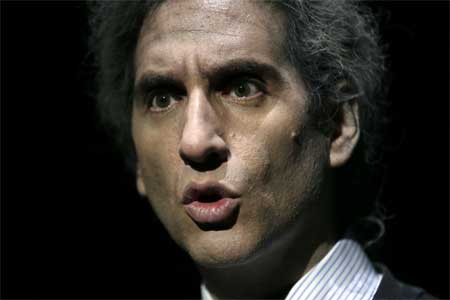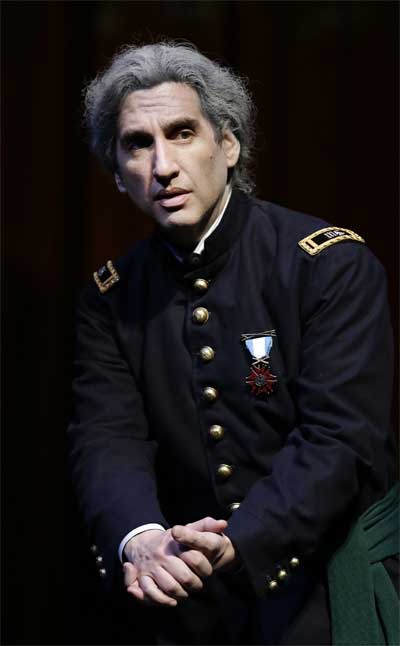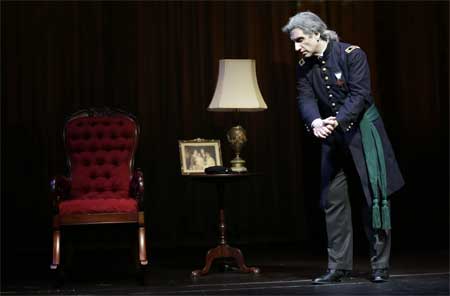Concert, Play, Performance
Written and performed by Hershey Felder
ArtsEmerson
Emerson-Majestic Theater, Boston
May 20 – 31, 2014

in “Abe Lincoln’s Piano”
Photo: Courtesy of ArtsEmerson
Hershey Felder, an accomplished pianist, has made a career of portraying the characters of musicians much in the same way that Hal Holbrook used to portray Mark Twain. As well, in addition to taking on the dramatic impersonation, Felder plays and sometimes sings to music by, and related to, the figure he’s embodying.
He began doing this about fourteen years ago with George Gershwin Alone, a show he took on the road for the better part of twelve years, seeing it through something like three thousand performances. He has also done similar dramatizations of Beethoven, Chopin, Lizst, and Leonard Bernstein.
I have seen the Gershwin show twice and the Bernstein show once and found them interesting and compelling.
I first saw the George Gershwin Alone at the American Repertory Theater in Cambridge about twelve years ago and, at the time, it struck me as fresh and innovative. By the time Felder got to performing this again at ArtsEmerson a couple of years ago, though still enjoyable, it felt a little worn out. I think Felder recognized that he had done that show enough already and pretty much put it on the shelf to rest for awhile.
The recent Maestro: Leonard Bernstein, however, was very powerful and revealing. It uncovered interesting features of Bernstein’s self-image and made considerable biographical drama out of focal elements in his biography.

in “Abe Lincoln’s Piano”
Photo: Courtesy of ArtsEmerson
Abe Lincoln’s Piano is, if I am not mistaken, Felder’s first about a more general historic figure, not a musician, and is written with a more indirect and nuanced narrative.
The premise of the show is a visit to the Chicago History Museum which houses the piano that was in the White House when Lincoln was president. Felder appears initially onstage as the curator of that collection. He introduces himself and begins to show the audience around the museum, as it were, and then, in short order, he morphs into the curator’s aunt, and, before long, into Dr. Charles Augustus Leale, the young army surgeon who was destined to take care of Lincoln after he was shot by John Wilkes Booth.
All along the route, Felder sings songs of the era. Quite a few are by Stephen Foster, whose persona is also evoked briefly but powerfully. In passing, one learns that he died very young, at 37, like Gershwin and Mozart, another incredibly prolific and accomplished musician who perished well before his time.
Felder, as Leale, tells of his posting in Washington, DC during the Civil War and attending to the wounded, facing the horrific challenges of determining where, among the masses of the wounded and dying, to spend his preciously scarce curative efforts.
Then there is the account of the time leading up to Lincoln’s assassination when Leale goes to the White House to see Lincoln deliver an address, and then, so taken by his features, decides to go to Ford’s Theater on the evening that Lincoln was meant to be there to observe him more closely. He was sitting fairly nearby when Lincoln was shot and hurried over to help. In short order he was designated by Mary Todd Lincoln, the president’s wife, to take charge of the situation. He was 23 years old.
Felder gives a moving and riveting portrayal of that sequence of events, and, in particular, those leading up to and following the shooting at Ford’s Theater. The intense and focused way in which he tells the story engenders a quietly charged awareness in the audience.
Along the way, he also embodies various characters who emerge in the narrative, including noted pianist Louis Moreau Gottschalk who played at one point for President Lincoln.
The singing of the miscellaneous songs is generally tender and beautiful. Felder does not have a highly tutored singing voice, but, when he sings quietly, as he mostly does, it is lovely. His delicate entrance into phrases, both pianistically and vocally, generates a delicate feeling of attunement which carries by and large through all the musical renditions.
Most of the music is authentically from the era, but Felder includes his own charming musical setting of Lincoln’s Gettysburg Address.

in “Abe Lincoln’s Piano”
Photo: Courtesy of ArtsEmerson
The only times I found Felder’s singing a bit off was when he tried to belt it out, for which his voice is not really trained. The problem could likely be alleviated by a bit of judiciously applied electronic amplification. I remember registering the same concern for loud vocal passages in his past performances.
Overall, though, this inventive and evocative narrative, along with Felder’s courageous and compelling dramatization, represents a new direction in the career of a unique and interesting performer, an accomplished musician, actor and playwright who has brought together his talents to create a moving series of portrayals that has embodied invention and surprise at every turn.
– BADMan
Leave a Reply